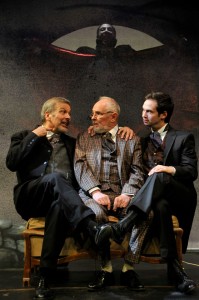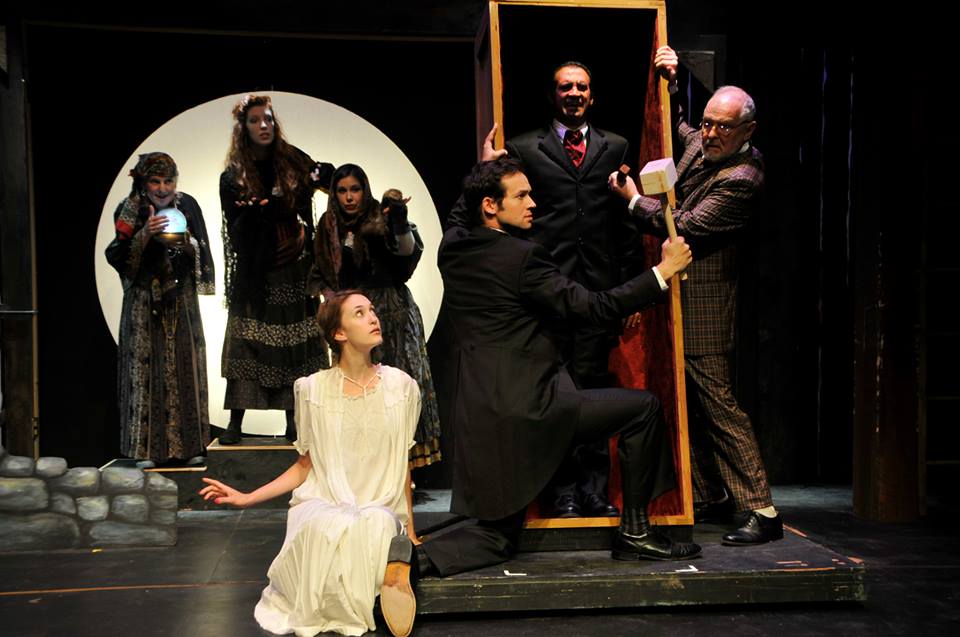Theater Review: “Laughing Stock” Redux
The current revival of Laughing Stock, directed again by the playwright, has softer edges than I remember in the earlier one, played with fluidity rather than crackle.
Laughing Stock by Chuck Morey. Directed by Morey. Staged by the Peterborough Players, Peterborough, New Hampshire, through August 18.
By Jim Kates

Dracula (Michael Goodfriend) looks on as Seward (Gus Kaikkonen) and Harker (Jed Resnick) hold down a panicked Van Helsing (Michael Page) in LAUGHING STOCK at the Peterborough Players. Photo: Deb Porter-Hayes.
Once upon a time, Charles Morey served a happy term as the artistic director of the Peterborough Players. He distilled the institutional traditions of that summer company—celebrating its 80th season this year—into a comic, theater-making-fun-of-itself piece called Laughing Stock, which has enjoyed success not only on its home ground but far afield. The Players initially mounted it in 2004 and have brought it back it for their current production, with several of the original cast reappearing, which adds an extra layer of in-joking to the characters à clef of the text, actual personages who have been part of the real Players’ community down through the years.
Of the 2004 production, I wrote at the time, “Scene after scene, beat after beat, Laughing Stock piles on the laughs, hitting every imaginable motif of theatre life, from the aspiring Ophelia to New York unemployment. A whole history of the modern stage flickers in and out, from Mickey Rooney and Judy Garland to Joseph Papp, Sarah Bernhardt and the Guthrie company. The stage teems with characters in and out of character, for two very long acts. There is a play-within-a-play that makes Peter Quince’s ‘Pyramus and Thisbe’ seem like the Royal Shakespeare Company in comparison, and also a non-Stoppardy backstage perspective on ‘Hamlet.’ . . . And then, surprisingly, at the end it suddenly descends into sentimentality and a predictable finale, intended to wrap us all in a well-worn fuzzy blanket, like those endings kids tack onto stories when they can’t find a clever way out.”
I see no reason to change that description, except to say that the sentimental ending takes on a less jarring, warmer tone in the context of the Players’ commemorative season, with photographs of their own history flashed behind the on-stage wrap-up.
The current production in general, directed again by the playwright, has softer edges than I remember in the earlier one, played with fluidity rather than crackle and with the cast in the first act delivering their lines somewhat deliberately, as if in elocution practice—an oddity that disappears in the second act and may not reappear at all after the first night. There’s a lively bit of business in the second act involving a skull being tossed around that also seemed more perfunctory than crisp, and I hope it picks up speed and spirit during the two-week run. In general, though, what a lot of comedy does with timing, Laughing Stock does with space and movement; so the laughs aren’t getting lost.
The only member of the company to take on the same role as he did nine years ago is Michael Page. I gave him barely more than a nod then, but now he comes close to running away with the show. The performer is not as blustery as he can be sometimes, but he is somehow complete, grounded, and still incomparably funny in the role of Richfield Hawksley, the elder statesman of the company, burdened and comically confused by knowing too much about his own theater.
Kraig Swartz as Craig Conlin, the company’s business manager, has stuffed his genie back into a bottle and gained a new comic strength by the compression, another case of less is more. Gus Kaikkonen, who played that role nine years back, has graduated to that of the embittered veteran actor Vernon Volker, but it’s a low-key, rather mellow bitterness that stays in the background. In the original production, Jack Koenig was a new face, but now he takes on the chief part of the Players’ artistic director, Gordon Page, enduring the slings and arrows of ourtrageous fortune with almost unflappable aplomb. I can’t help wishing he’d flap a little more. Lisa Bostnar was in an earlier incarnation the radical deconstructionist director Susannah Huntsman, who reimagines Charley’s Aunt as a transgendered parable. That role is now being played by a newcomer from the real Players’ Second Company, Elise Hudson, while Bostnar has taken on the fictional stage manager’s job, quietly performing the miracles that make her productions work and noisily patching up problems when they threaten not to.

The climactic scene of Dracula, Prince of the Undead, one of the plays-within-the-play of LAUGHING STOCK. Photo: Deb Porter-Hayes.
The real stage manager of both the 2004 production and this one, Allison Deutsch, has a grand job to do herself, along with the scenic designer Bill Clarke and the man on lighting, John Eckert. People like these don’t get mentioned often enough in reviews, except when things go wrong. Here, when things go wrong, it’s because they’ve been doing their job right.
The young leads Mary Pierre and Tyler Taylor are taken by young leads Erin Neufer and Michael Goodfriend. Goodfriend’s earnest Dracula (“What’s my as if?”, in the embedded version of the story that highlights the second act, plays very nicely with Neufer’s would-be sacrificial virgin.
The valedictory tone of the conclusion of Laughing Stock makes it feel like the season’s end. But it’s not. We’re only a little more than half way through the Peterborough Players’ 80th summer—all comedies so far—and this one, which has garnered the biggest and the most sustained laughter, is quite definitely Undead. “Kisses on your opening,” Daisy Coates (Dale Hodges) blesses the Players’ Hamlet, and “Kisses on your opening” for Laughing Stock, too.
